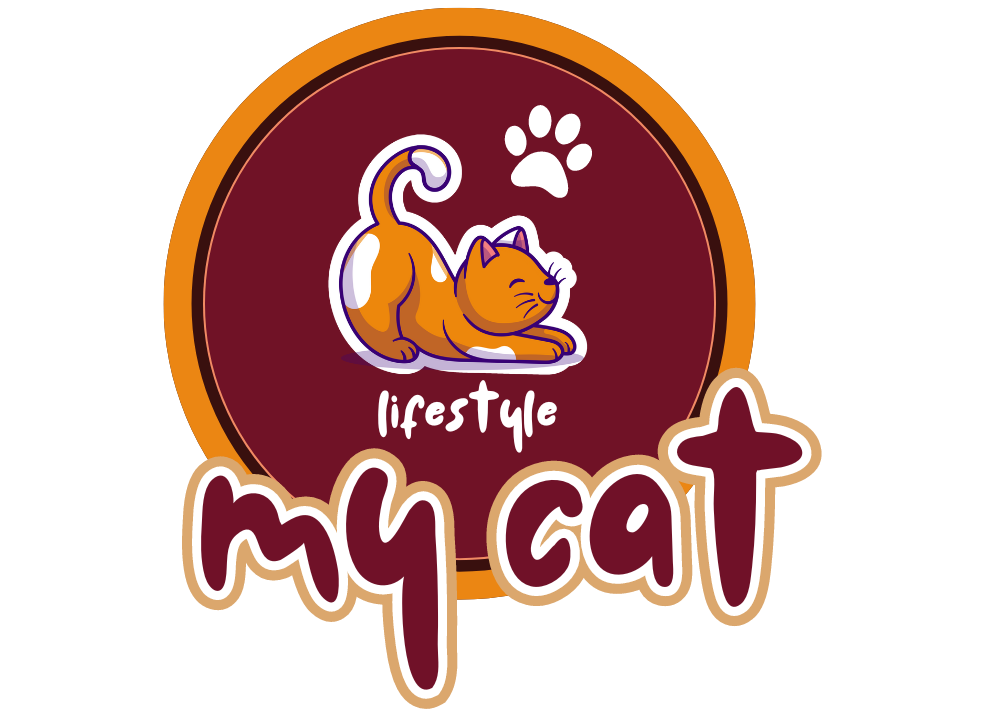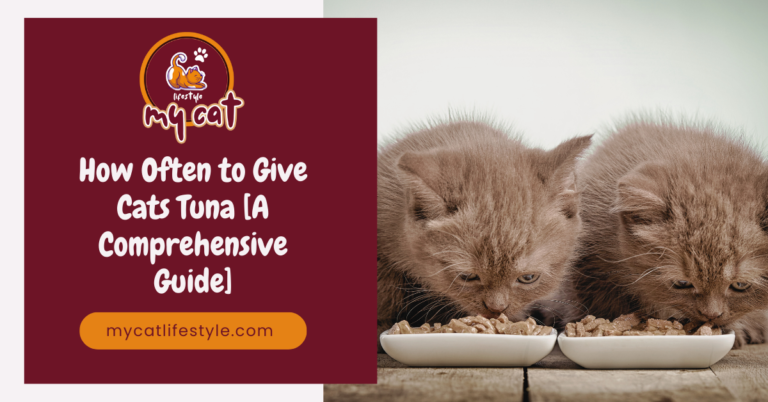Can Cats Eat Salmon Bones? (Or Skin) Health Guideline & Important Facts
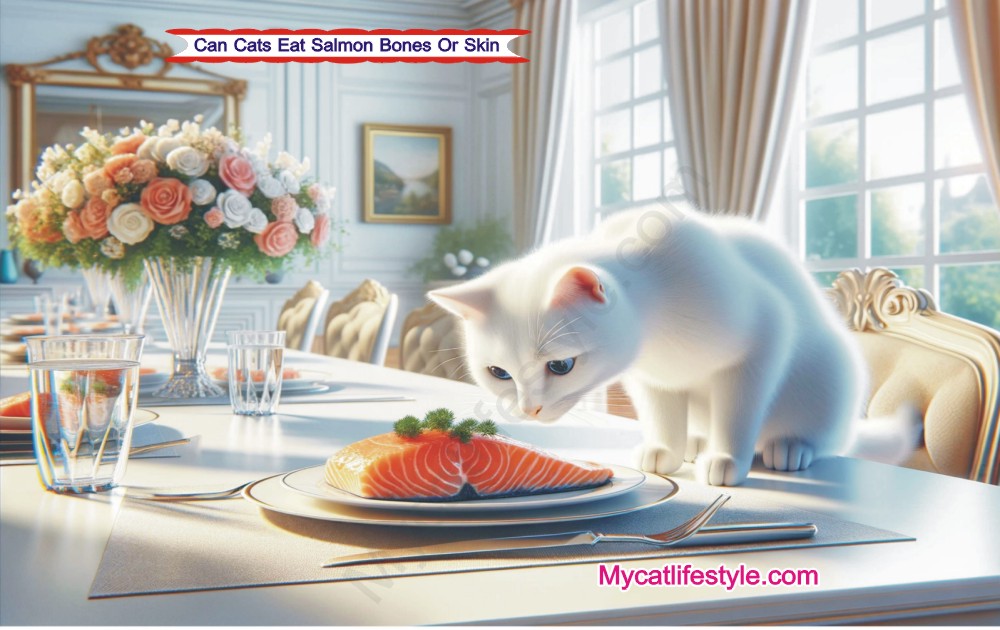
It’s crucial to keep it straightforward regarding your cat’s diet: avoid giving them any bones from fish or other meats. The danger of choking is significant—if a bone or a fragment lodges itself in their mouth, throat, or stomach, the consequences can be severe. Life is already full of enough hazards for our furry friends, so let’s not complicate things by introducing such risks.
The cost of bones goes beyond the potential health crisis for your pet. An emergency trip to the vet can also take a heavy toll on your finances. And, should the unthinkable happen and your cat suffer severely from a preventable mistake, the emotional burden can be overwhelming.
Interestingly, surprises can happen even when you think you’re making a safe choice. For example, I once discovered a sizable, hard bone in a can of premium moist cat food—a fish variety normally a treat for my cat. It was a stark reminder that even trusted brands can slip up. This experience was a real eye-opener, and now, I make it a point to meticulously inspect my cat’s food before serving. Even with pre-packaged meals, vigilance is key. So, next time you’re spooning out some of that flaky, moist cat food, take a good look to ensure it’s safe for your beloved pet. It’s always better to be safe than sorry, especially for those we love.

Can Cats Eat Salmon Bones?
If you asked me whether cats can safely consume salmon bones, I’d initially think yes, especially considering how much my family enjoys salmon. However, we don’t often indulge in fresh salmon due to the high cost. Instead, we opt for canned red sockeye salmon, perfect for when we crave homemade salmon patties.
The process involves letting the salmon slide out of the can, gently separating it, and removing the spine. This reveals numerous tiny, soft bones that crumble easily. I’ve never felt the need to remove these bones; they seemed to melt away into the fish as I mixed the patties, adding a bit of calcium. I used to offer our cats a small sample of the canned salmon before adding any other ingredients, never worrying about these bones posing a risk.
However, experts in feline nutrition strongly advise against giving cats any fish that might contain bones due to the persistent risk of choking, despite how meticulously you might remove them. I’ve decided not to take the risk anymore. It’s important to remember that domestic cats differ from wild counterparts, who can handle a more rugged diet. Moreover, consuming too much fish can harm cats because of potential mercury levels and thiaminase in fresh fish, which can disrupt their nutritional balance.

What To Do If My Cat Eats Salmon Bones?
While I initially believed that the soft, crumbly salmon bones found in canned products would be harmless for cats since they can be easily crushed between your fingers, I have reconsidered. These bones differ from those in a fresh salmon fillet, which are more rigid. However, I’ve decided to avoid giving my catfish or meat containing small bones, as they pose a choking hazard.
Cats fare best on specially formulated dry kibble and wet cat food designed to be easily digestible. Fish bones, often less brittle, pose a significant danger to a cat’s delicate mouth, esophagus, and digestive tract.
Should your cat stealthily snatch a piece of salmon off the counter while you’re preparing a meal, there’s a real risk they could ingest a bone. Despite some cats’ fondness for fish bones, the potential threat to their health is too great to ignore.
If your cat exhibits any signs of swallowing difficulty or attempts to vomit, it’s crucial to act swiftly. Contact your veterinarian immediately—every minute counts in such emergencies. If you spot a bone lodged in your cat’s mouth, you might attempt to remove it, but be cautious. Excitement could cause your cat to swallow the bone inadvertently. As any experienced cat owner knows, removing a bone is no simple task and requires careful handling to avoid worsening the situation.

How to Prepare Salmon for Your Cat
When giving salmon to your cat, prepare it in specific ways to keep it safe.
Can Cats Eat Raw Salmon?
Cats might be able to eat raw salmon, but it’s not recommended. Raw salmon that has been flash-frozen is safer, but there are still risks like parasites and infections. If you give your cat raw salmon, ensure it’s deboned, and the head and tail are removed to prevent choking or damage to their digestive system.

Can Cats Eat Smoked Salmon?
Cats can eat smoked salmon, which might not be good for them. Smoked salmon often has spices and salt, which can be harmful. If you didn’t prepare the smoked salmon yourself and need to figure out how it was made, it’s best to avoid giving it to your cat. Some types of smoked or cured salmon are so salty they can be toxic.
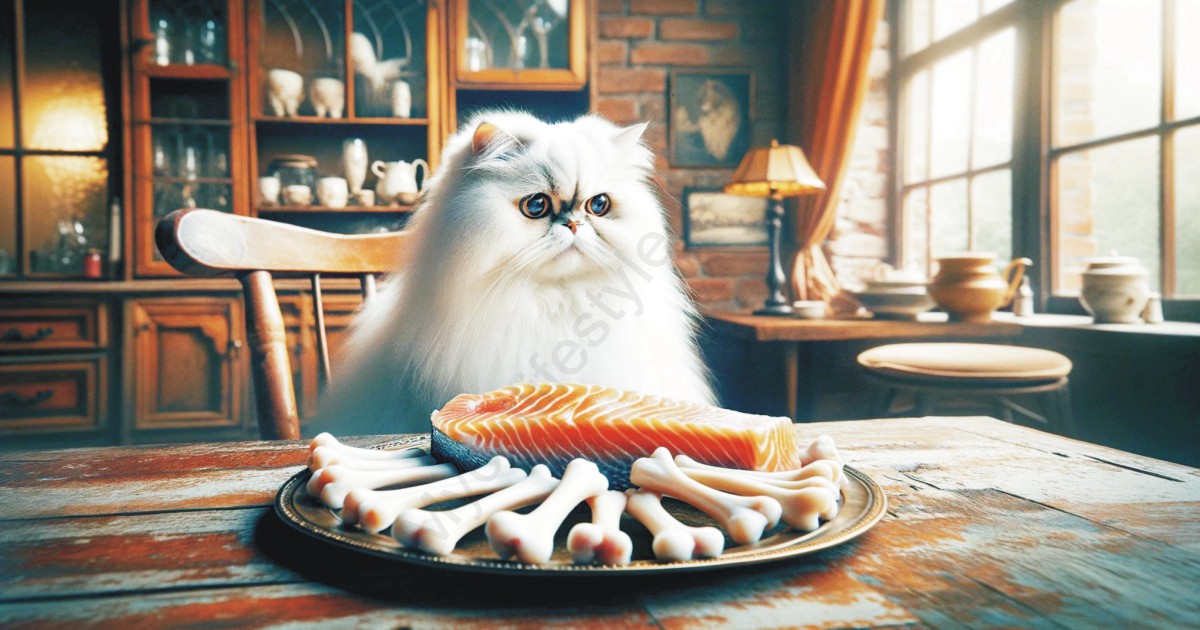
What’s the Best Way to Feed My Cat Salmon?
The safest way to give salmon to your cat is by cooking it thoroughly. You can poach, grill, bake, or pan-fry the salmon without adding seasonings or salt. Make sure it’s cool before you give it to your cat.
But Can Cats Eat Salmon Skin?
Yes, cats can eat salmon skin. You can leave the skin on when you cook salmon for yourself and your cat. It’s safe as long as your cat doesn’t have a sensitive stomach, and it’s rich in omega-3 and omega-6 fatty acids, which are good for them.

Can Cats Eat Salmon Skin?
Cats grow on a diet rich in protein, antioxidants, and omega-3 fatty acids. While salmon, including its skin and water-packed tuna, can provide these essential nutrients and make for delightful occasional treats, they should not constitute the entirety of a cat’s diet. This is because, aside from salmon or tuna, other crucial nutrients vital for your cat’s overall health might be missing if they consume primarily human-grade fish.
Moreover, certain types of fish, like the salmon used in sushi, can potentially upset a cat’s stomach.
Dietary experts caution against frequent fish in a cat’s diet due to the possible presence of mercury, which can be harmful. Additionally, an enzyme called thiaminase in raw fish poses another risk. It breaks down thiamine (vitamin B1) in cats, which is crucial for their neurological health. A thiamine deficiency can lead to serious issues, including neurological problems and convulsions.

My Cat Loves Human Fish. What Kind of Human Fish is Safest for My Cat?
Are you one of those cat parents? Do you find it hard not to give your cat special fish treats? I’ve learned from being a cat owner that human food isn’t good for cats. My cats don’t eat food from the table anymore. They only get a little bit of tuna from a can sometimes. They shouldn’t have human food because it doesn’t have the nutrients they need.
You can occasionally treat your cat to a little canned tuna, sardines, or salmon. Give them only a teaspoon or two and not more than twice a week. These canned fish are safer than fresh fish and don’t have thiamine’s, which is bad for cats and is found in raw fish. Be careful with salmon because some cats are allergic to it. If your cat gets sick with vomiting or diarrhea after eating salmon, it might be allergic.
If your cat needs medicine and it’s hard to give it to them, try mixing it with some canned tuna juice. This has worked well for me. Some people look up how to cook fresh fish for cats online. I find it easier and safer to stick to canned fish. I still check for bones to be safe because sometimes they are found in canned fish, just like in regular cat food.
Should I Buy Salmon Oil for Cats?
Giving your cat salmon oil supplements might be a simpler way to provide them with the benefits of salmon. This avoids the need for extra cooking and portioning. Vets often suggest adding half a teaspoon of salmon oil to your cat’s daily food. However, talking to your vet before starting any new supplement is important. Your vet understands your cat’s specific health needs and can advise whether salmon oil is a good choice.
What to Do if Your Cat Is Choking
If you think your cat is choking, the first thing to do is check if something is blocking their airway. Carefully open their mouth and look inside. You can use your index finger to gently feel around your mouth for any blockages. Be careful not to push any object further down their throat.
If you can’t remove the blockage and your cat can’t breathe, you might need to perform a Heimlich maneuver for cats while you’re going to the vet. Even if you remove the obstruction, taking your cat to an emergency vet is crucial.
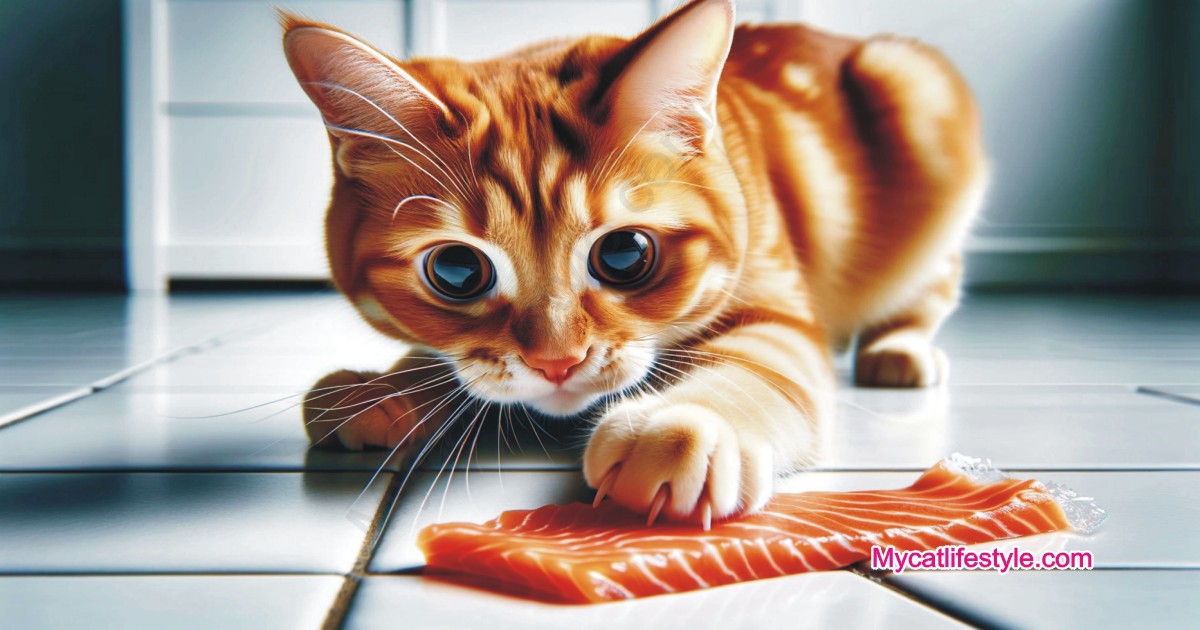
Frequently Asking Questions
Can Cats Eat Raw Salmon Bones?
Understanding that raw salmon bones can be dangerous for cats is crucial. While they might seem soft, raw bones can splinter, causing choking or harming your cat’s digestive tract. The risk of splintering diminishes once the bones are cooked, but they can still pose a choking hazard and should generally be avoided.
Can Cats Eat Salmon Bones in Water?
If you’re referring to canned salmon in water, it’s generally safer than raw salmon, as the bones in canned salmon are typically softened during the canning process, making them easier to digest. However, checking for large or sharp pieces before serving is always best.
Can Cats Digest Salmon Bones?
Cats can digest softened salmon bones, such as those found in canned products. However, feeding your cat raw or improperly cooked salmon bones is not advisable due to the risks of blockages or injuries from bone fragments.
What Part of Salmon Can Cats Eat?
The safest part of salmon for cats is the flesh. Ensure it’s cooked thoroughly without any added oils, seasonings, or salt. Cooked salmon is a great source of protein and omega-3 fatty acids, which can help keep your cat’s coat shiny and support their immune system.
What Bones Can Cats Not Eat?
Cats should avoid most types of cooked bones, not just those from fish. Cooked bones from poultry, beef, or pork can also splinter and cause internal damage or obstructive risks. It’s best to stick to bones specifically prepared for pets, such as those from pet food brands that are processed to be safe.
Is Salmon Good for Cats’ Joints?
Salmon benefits cats, especially due to its high omega-3 fatty acid content, which can help reduce inflammation and benefit joint health. Including small, controlled portions of cooked salmon in your cat’s diet can contribute to their overall joint health and mobility.
Final Thoughts
Fatty fish are an excellent source of omega-3 fatty acids, which are important for your cat’s health. However, there are risks involved with feeding fish to cats. The safest approach is to always serve cooked fish and to be cautious about the types and quantities you provide.
If you decide to give fish to your cat, make sure to remove all the bones first. Bones from both raw and cooked fish can be dangerous. They can get stuck in your cat’s mouth, throat, or digestive tract, potentially causing serious harm.
